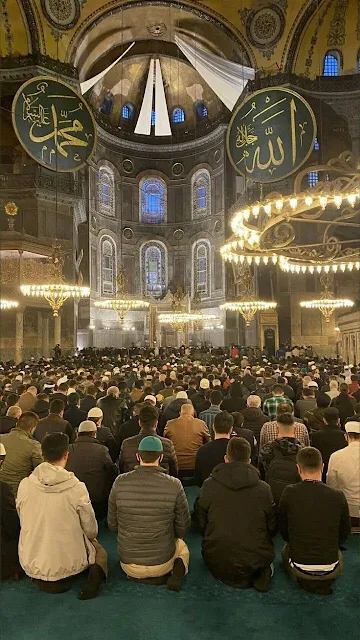In the name of Allah, the Most Gracious, the Most Merciful. May peace and blessings be upon our beloved Prophet Muhammad (peace be upon him) and upon all those who follow his righteous path.
(بسم الله الرحمن الرحيم، والصلاة والسلام على حبيبنا محمد صلى الله عليه وسلم وعلى من اتبع صراطه المستقيم.)
Dear Readers,
السلام عليكم ورحمة الله وبركاته. (As-salamu alaykum wa rahmatullahi wa barakatuh -May peace, mercy, and blessings of Allah be upon you).
Firstly, I extend my heartfelt thanks to the questioner who raised this profound query. I'm humbled and grateful for this insightful question about the power of prayer. Today, I invite you to embark on a journey of exploration into a profound question: “Why is prayer the best meditation for mankind?”
In our fast-paced world, where stress and anxiety have become commonplace, the quest for inner peace and mental clarity is more relevant than ever. For the past 10 years, I've had the privilege of working as a religious, health, and psychological consultant, and I've consistently witnessed the transformative impact of prayer on individuals' well-being. It's a topic close to my heart, and I'm delighted to share some reflections on why prayer, specifically Salah in Islam, is the ultimate form of meditation for humankind.
Let us explore how prayer transcends the conventional practices of meditation and why it stands as the ultimate source of mental, physical, and spiritual healing.This blog aims to explore why prayer stands out as the best meditation for mankind, offering insights that can inspire you to incorporate this practice into your daily life.
Prayer: A universal language of faith:
Research consistently shows that prayer is not only fulfills our religious obligations but also serves as a powerful tool for psychological health. It's not merely a ritual; it is an intimate dialogue with the Almighty. Unlike traditional meditation, which primarily focuses on the self, prayer connects the soul to its Creator, fostering a sense of divine tranquility.
From The Holy Quran:
"When you have finished the prayer, remember Allah standing, sitting, and lying on your sides. But when you are secure, establish the prayer." (4:103)
This Ayah emphasizes the constant need for prayer, whether in formal or informal states, making it a form of ongoing meditation.
The Prophet Muhammad (peace be upon him) said, "Verily, in the remembrance of Allah do hearts find rest" (Qur'an 13:28).
From The Holy Bhagavad Gita:
"If one offers me with love and devotion a leaf, a flower, a fruit, or water, I accept it." (Chapter 9, Verse 26):
This verse emphasizes the importance of sincerity and devotion in offering one's prayers, rather than the material value of the offering itself.
From the Holy Bible :
"Do not be anxious about anything, but in every situation, by prayer and petition, with thanksgiving, present your requests to God. And the peace of God, which transcends all understanding, will guard your hearts and your minds in Christ Jesus." (Philippians 4:6-7)
These verses emphasize the importance of prayer in daily life and its profound impact on the human spirit.
From the Holy Tripitaka:
The Buddha's first sermon, which outlines the Four Noble Truths and the Eightfold Path, shows the importance of meditation in reaching enlightenment, calling it the true path to peace and liberation. Meditation, along with prayer, is central in this teaching. (The Turning of the Wheel of Dharma - Dhammacakkappavattana Sutta)
This profound truth highlights that true peace and serenity lie in connecting with Almighty, making prayer the most fulfilling form of meditation.
Physical Benefits: Healing Through Prostration:
Scientific research has revealed that the postures of Islamic prayer, particularly sajda (prostration), enhance blood circulation to the brain, improve posture, and release tension from the body. Reflecting on my professional experience, I've witnessed countless individuals transform through the practice of prayer.
The gentle movements and structured routine act as a form of mindful exercise, improve digestion, stress reduction, keeping the body agile and promoting better metabolism. Patients suffering from high blood pressure, joint pains, or cardiovascular issues often find relief through consistent prayer, proving its unmatched therapeutic impact. Furthermore, the act of washing before prayer promotes hygiene and cleanliness. It helps to improves sleep and relaxation, reduce age-related memory loss and includes so many physical benefits that scientifically proven since long.
Many have reported reductions in physical anxiety as they cultivated a routine of regular Salah. These transformative stories not only reinforce the psychological benefits of prayer but also underline the timeless wisdom of our faith; in every act of worship, there is healing.
Psychological Healing: Calming the Mind and Soul
Studies confirm that individuals who pray regularly experience greater emotional stability, reduced anxiety, and enhanced self-awareness. In my years of counseling, I have encountered numerous individuals struggling with anxiety, depression, and emotional turmoil. The repetitive nature of the movements and recitations in prayer creates a rhythmic flow, similar to that of mindful breathing exercises, enhancing the serenity of the moment.
Salah (Islamic prayer) is a divine prescription that alleviates stress and cultivates mental clarity. With every "Allahu Akbar" (Allah is the Greatest), we remind ourselves to detach from worries and center our hearts and minds on gratitude and forgiveness. The rhythmic movements, combined with deep breathing and heartfelt supplication, activate the brain’s relaxation response, reducing cortisol (the stress hormone) and increasing dopamine (the happiness hormone).
Reciting the Quran aloud, even in a low voice, has been shown to have a calming effect on the nervous system, reducing stress and anxiety. The meaning of the words, when contemplated upon, provides guidance and direction, illuminating our path in life. Research has shown that regular prayer builds resilience against life's challenges, helping individuals cope better with stressors.
The Spiritual Connection: The Ultimate Tranquility
The most significant aspect of prayer is the spiritual connection it fosters. It's a direct line of communication with our Creator. Through prayer, we express our gratitude, seek forgiveness, and ask for guidance. This intimate connection brings a sense of peace and contentment that surpasses any other experience. It provide regular doses of tranquility throughout the day, helping us to stay grounded and centered amidst the challenges of life.
The five daily prayers act as a constant reminder of Allah and our purpose in life. It reminds us that we are not alone, that there is a higher power watching over us, supporting us, and loving us unconditionally.
#prayerismedication, #prayerismeditation, #thebestmeditation, #powerofprayer, #prayerforpeace, #stressreliefprayer, #anxietyreliefprayer
Disclaimer: This blog post is for informational purposes only and does not constitute professional advice. If you are struggling with anger management, it is important to seek help from a qualified professional.













.jpg)

.png)




0 Comments